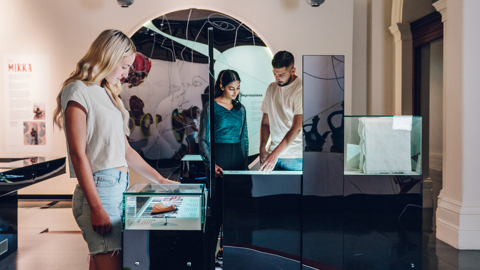
Safe Journeys Program
Support students to become safe, independent travellers as they near the milestone of starting high school.
Created in collaboration with Year 6 teachers and the Victorian Government’s Road Safety Partners, the Safe Journeys Program empowers students to develop trip planning skills – including the best route to and from secondary school – as well as safe road and public transport practices.
Students will experience
- An interactive and immersive visit to the Road to Zero Experience Space, including: a virtual reality experience where students travel in a car from 1970 to 2055; an elevator simulation where students experience a dramatic ‘drop’ from the 11th floor of the Royal Exhibition Building as well as a digital exploration of the Transport Accident Commission’s well-known Graham sculpture.
- Using touchtable technology to create a video advertisement with supporting evidence, pre-shot footage, sounds effects and music.
- Working collaboratively in groups to create a persuasive health ad.
Students will learn
- To develop and apply road safety knowledge to plan journeys, including the Safe System approach.
- About developing safe road and public transport practices to become competent independent travellers and commuters to and from secondary school and other locations.
- To examine and analyse the persuasive elements and features of video advertisements.
Other key information
- How does the program work?
The free Safe Journeys Program includes eight engaging activities designed to be undertaken at school and two activities at Road to Zero at Melbourne Museum.
A key aspect of the program is the opportunity for students to apply their road safety knowledge by planning and undertaking the journey to Melbourne Museum, where they’ll extend their learning through interactive, immersive road safety experiences.
- Program resources
The Safe Journeys Program is supported by a Teacher Guide, including lesson activities, teaching tips, additional resource links, curriculum outcomes and extension ideas.
Please refer to the downloadable program overview and Safe Journeys Program Teacher Guide for details.
Student work can be completed in the Safe Journeys Program Student Road Map. This interactive workbook allows students to keep their learning in one place and collect virtual stamps along the way to recognise their learning.
Related links
- Safe Journeys Program Overview| 1.24 MB .pdf file
- Safe Journeys Program Teacher Guide| 8.58 MB .pdf file
- Safe Journeys Program Student Road Map| 3.17 MB .pdf file
- Road Safety Education Victoria



Availability
Term 4, Monday to Friday
10:30am to 2pm
Duration: 3.5 hours
Student information
Year 6
Maximum 25 students
Bookings
Workshop
Presented by a museum educator with provided activity
Victorian Curriculum Links
Health and Physical Education: Levels 5 and 6
Contribution to health communities
- investigate different sources, quality and types of health information and how these apply to their own and others’ health choices (VC2HP6P09)
- analyse how various strategies influence the health, safety, relationships and wellbeing of individuals and communities (VC2HP6P10)
English: Level 6
Language for expressing and developing ideas
- identify the ways that still images (such as figures, tables, diagrams, maps and graphs), moving images and sound are used in texts to create point of view (VC2E6LA07)
Interacting with others
- deliver structured spoken and multimodal texts to an intended audience for a specific purpose, using appropriate features of voice (VC2E6LY02)
Texts in context
- examine texts, including media texts, that represent ideas and events, and identify how they reflect the context in which they were created
(VC2E6LY06)
Analysing, interpreting and evaluating
- analyse how text structures and language features work together to meet the purpose of a text and engage and influence audiences
(VC2E6LY07)
Media Arts: Levels 5 and 6
Creating
- use media languages, media technologies and production processes to construct media arts works that communicate ideas, perspectives and meaning for specific audiences
(VC2AMA6C01)
Ethical Capability: Levels 5 and 6
Understanding ethical concepts and perspectives
- the meaning of a worldview, and how worldviews influence ethical perspectives, and simple connections between influences on ethical perspectives, such as between rights and responsibilities and shared expectations, or between worldviews and values (VC2CE6U02)
Accessibility
Please view our accessibility page for general information. Contact our team on 13 11 02 or email us at [email protected] to discuss how we can support your visit.
Museums Victoria Learning Access Fund
The Museums Victoria Learning Access Fund aims to enhance access to our museums (Melbourne Museum, Scienceworks and Immigration Museum), programs and events by offering free or subsidised education programs for eligible schools. Find out more about the fund.

Sign-up to Museum Teachers
Subscribe and get special offers, teacher news and free entry to all museums.






